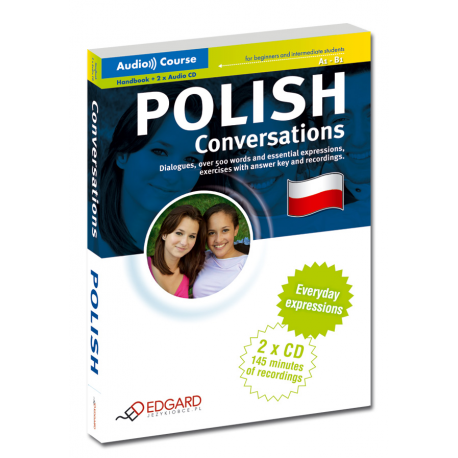




Verb - Czasownik
The infinitive form of a verb ends in a vowel plus -ć e.g. pisać (to write), jeść (to eat), czytać (to read). Some end in -ść or -źć, as nieść (to carry), znaleźć (to find), and a few and in -c, e.g. móc (to be able).
There are also so called reflexive verbs going together with the particle się (self) e.g. myć się (to wash), zgubić się (to lose one’s way), bać się (to be afraid of), śmiać się (to laugh). The particle się may either follow or precede the verb.
Grammatical aspects
It is vital to mention that the Polish verbs occur in two grammatical aspects: imperfective and perfective.
In general, the imperfective aspect indicates the activity itself e.g. pisać (to write), jechać (to go), kupować (to buy), while the perfective aspect indicates that the activity has been accomplished e.g. napisać (to write, to produce something), dojechać (to go, to get there), kupić (to buy, to get the desired product) e.g.
Pisałam raport. – I was writing a report.
Napisałam raport. – I wrote a report.
Kupowałam nową sukienkę. – I was buying a new dress.
Kupiłam nową sukienkę. – I bought a new dress.
Basic verbs:
to be – być
ja jestem
ty jesteś
on / ona / ono jest
my jesteśmy
wy jesteście
oni / one są
to have - mieć
ja mam
ty masz
on / ona / ono ma
my mamy
wy macie
oni / one mają
to eat - jeść
ja jem
ty jesz
on / ona / ono je
my jemy
wy jecie
oni / one jedzą
to go - iść
ja idę
ty idziesz
on / ona / ono idzie
my idziemy
wy idziecie
oni / one idą
This article was based on: Polish for foreigners
There are also so called reflexive verbs going together with the particle się (self) e.g. myć się (to wash), zgubić się (to lose one’s way), bać się (to be afraid of), śmiać się (to laugh). The particle się may either follow or precede the verb.
Grammatical aspects
It is vital to mention that the Polish verbs occur in two grammatical aspects: imperfective and perfective.
In general, the imperfective aspect indicates the activity itself e.g. pisać (to write), jechać (to go), kupować (to buy), while the perfective aspect indicates that the activity has been accomplished e.g. napisać (to write, to produce something), dojechać (to go, to get there), kupić (to buy, to get the desired product) e.g.
Pisałam raport. – I was writing a report.
Napisałam raport. – I wrote a report.
Kupowałam nową sukienkę. – I was buying a new dress.
Kupiłam nową sukienkę. – I bought a new dress.
Basic verbs:
to be – być
ja jestem
ty jesteś
on / ona / ono jest
my jesteśmy
wy jesteście
oni / one są
to have - mieć
ja mam
ty masz
on / ona / ono ma
my mamy
wy macie
oni / one mają
to eat - jeść
ja jem
ty jesz
on / ona / ono je
my jemy
wy jecie
oni / one jedzą
to go - iść
ja idę
ty idziesz
on / ona / ono idzie
my idziemy
wy idziecie
oni / one idą
This article was based on: Polish for foreigners
Tagi: polish, polish for foreigners, polish language, polski, nauka języka, nauka języka polskiego, gramatyka, gramatyka polska, verbs
Zaproponuj zmianę
Zobacz też:
Polecamy również:
Polecamy również:

|
Polski Konwersacje Polish Conversations (Książka + 2 x CD Audio)
Dialogi, ponad 500 słów i zwrotów oraz ćwiczenia z kluczem odpowiedzi. Dialogues, over 500 words and essential expressions, exercises with answer key and recordings. |



 Polski
Polski
 Angielski
Angielski Arabski
Arabski Chiński
Chiński Chorwacki
Chorwacki Czeski
Czeski Duński
Duński Fiński
Fiński Francuski
Francuski Grecki
Grecki Hiszpański
Hiszpański Holenderski
Holenderski Japoński
Japoński Niemiecki
Niemiecki Norweski
Norweski Portugalski
Portugalski Rosyjski
Rosyjski Szwedzki
Szwedzki Turecki
Turecki Ukraiński
Ukraiński Węgierski
Węgierski Włoski
Włoski
















